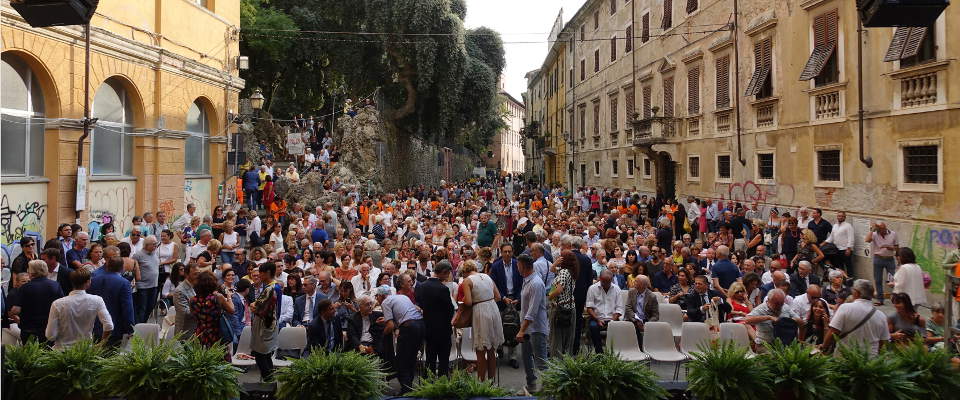As Italy prepares to emerge from the coronavirus emergency and discuss revitalization proposals, a bill is being debated in Trentino that will be voted on tomorrow and risks setting a dangerous precedent: it is the Fugatti-Spinelli ddl, which guarantees a series of aids (including measures of pure welfarism, e.g. non-repayable grants for seasonal workers, shopping vouchers, extraordinary treatments of 600 euros per month for entrepreneurs and professionals who declare cessation of activity), but at the same time inflicts very heavy cuts on culture. This is more than 2 million euros that penalize several facilities, starting with the Mart of Trento and Rovereto (which loses 900 thousand euros), the library system of Trentino (400 thousand euros less), and music schools (200 thousand euros less).
Trentino’s administration is therefore in danger of inaugurating an inefficient model for the revitalization of Italy plagued by the crisis caused by the coronavirus: cuts to culture to finance welfarism. A path that, at the moment, some small realities of the territory are following: it has become a national case, for example, the affair of the Municipality of Deruta, where the director of the two local museums is being sought, without due and proper remuneration, because the administration, the mayor explained, must now face the expenses for the management of the crisis. And also in Umbria, in Bastia Umbra, the municipality has doubled the funds for shopping vouchers, going, however, by the first citizen’s own admission, to economize on the areas of culture, schools and social work.
We have been repeating on these pages since time immemorial that direct aid should be limited to the emergency period only, and that the best way to restart the country is to invest in work and stimulate demand. All of this by acting in a twofold direction, if we think of our sector: that of services and that ofcultural offerings, two sectors that are suffering greatly at the moment. We are seeing this, these days, in the museum sector and especially in the library sector, which at the moment seems to be the hardest hit: in Florence, for example, workers in the sector took to the streets yesterday to denounce with discouragement a situation that is anything but rosy, and which sees libraries closed (in Florence alone, there are still barred doors in eight out of thirteen civic libraries, and the five that remain open do not guarantee all services, and operate on reduced hours) and precarious workers in danger of being left at home. It is therefore natural to wonder whether it makes sense to do as is being done in Trentino, where savings are being made on libraries at the risk of terminating the contracts of the precarious workers who would have worked with those funds that will now be used to give them relief while they stay at home doing nothing, or at most take mandatory refresher courses.
It will be objected by saying that the cuts are to ensure aid to a vast plethora of professionals and businesses struggling in the aftermath of the coronavirus. But even if one wants to leave out in-depth insights into the social role of culture and reason only in terms of mere economic development, one can just as easily retort by saying that investment in culture is an extraordinary economic multiplier: three reasons may suffice to argue this position. First: an investment in culture is a long-lasting investment, as Francesca Velani, director of LuBeC, has effectively explained on these pages, giving the example of Parma Italian Capital of Culture, an event for which significant resources were also invested with a view to improving the city’s facilities. Second, disinvesting means prolonging the crisis in the sector, and a crisis that is too long means, to use Alessandro Bollo’s words, “putting out of the market many of the skills and people that keep the many small cultural realities going and that collaborate and gravitate more or less permanently around the medium and large institutions the damage would be enormous.” This means that when it comes time to restart, everything will be much more complicated, not to mention that Italy will also risk losing international competitiveness. Consider even just the tourism sector (during the emergency we heard repeated to exhaustion that Italy’s GDP depends on tourism for 13 percent): cuts to culture mean less attractive facilities and cities for travelers. Third, culture generates a very rich supply chain: see in this regard the annual reports of the Symbola Foundation on the effects of each euro invested in culture, which earns at least twice as much in other sectors.
It will be worth focusing on this last point by highlighting a glaring example, that of cultural festivals, which depend largely on local government subsidies, but which often achieve the effect of triggering important returns on investment and which generate direct employment (that of the professionals and workers involved in various capacities in the organization of the events) and indirect employment (accommodation facilities that host tourists, bars and restaurants, the retail trade). Suffice it to say that, in Pordenone, where one of the country’s most important literary festivals is held(Pordenonelegge), merchants were among the first to rejoice at the news of the confirmation of the 2020 edition, since the event guarantees an important amount of work, in the city, for the sector. Cultural festivals are not only important moments of reflection (a point on which there has been much discussion and continues to be debate, with more or less critical positions), but they also represent an important voice for the development of the territories of reference, also attracting tourism and growing the reputation of the cities that host them: a Confcommercio report explains that even smaller events bring several economic benefits (investment by the organizers in the development, organization, management, promotion and communication of the event, resulting in a greater contribution to the service sector on a local and regional scale, spin-offs that remain in the territory, involvement of the local economic fabric, from clothing to crafts via food and wine). And as a result, not a few cities (it happens, for example, in Pordenone and Carrara) are already seeing trade associations pushing these weeks to plan events for the summer that will also have the effect of supporting commerce.
 |
| A moment from the Convivere festival in Carrara |
In several cities in Italy, the fundamental economic role of culture has been understood. Mantua confirmed a few days ago the 2020 edition of Festivaletteratura, the same is happening in Sarzana where the Festival della Mente will be held again this year, and in Carrara where it is today’s news that the contingent situation will not prevent the fifteenth edition of the Convivere festival from being organized, not to mention the many exhibitions set up around Italy that have been confirmed or extended. And there are also places where museums have returned to normal operations. At the moment, the sector most in distress is that of libraries and archives, which has the misfortune of being burdened by heavy anti-contagious regulations that affect surfaces and objects, and which, for example, impose quarantine even on books: but workers and professional associations are already taking action to demand a revision of the rules based on the latest scientific findings regarding the permanence of the virus on surfaces. The only discriminator for reopenings and programming in the short and medium term will, of course, be compliance with the anti-contagious measures that will be in place at the time of the event or reopening. But we can say that culture, from this point of view, has nothing to fear.
This is not to say that measures to help the less advantaged classes are not useful; on the contrary, it is precisely at times like these that it is necessary to narrow the social gap. But one of the best means to do this is to incentivize work rather than to assist at home those who might be able to work if only investments were well directed and if it were thought that culture is not a burden to be slaughtered with indiscriminate cuts, but is an area in which to invest if we want to guarantee a future for those who have suffered the consequences of the crisis. And the risk that we disinvest in culture to do mere welfarism will have to be averted as much as possible.

The author of this article: Federico Giannini
Nato a Massa nel 1986, si è laureato nel 2010 in Informatica Umanistica all’Università di Pisa. Nel 2009 ha iniziato a lavorare nel settore della comunicazione su web, con particolare riferimento alla comunicazione per i beni culturali. Nel 2017 ha fondato con Ilaria Baratta la rivista Finestre sull’Arte. Dalla fondazione è direttore responsabile della rivista. Nel 2025 ha scritto il libro Vero, Falso, Fake. Credenze, errori e falsità nel mondo dell'arte (Giunti editore). Collabora e ha collaborato con diverse riviste, tra cui Art e Dossier e Left, e per la televisione è stato autore del documentario Le mani dell’arte (Rai 5) ed è stato tra i presentatori del programma Dorian – L’arte non invecchia (Rai 5). Al suo attivo anche docenze in materia di giornalismo culturale all'Università di Genova e all'Ordine dei Giornalisti, inoltre partecipa regolarmente come relatore e moderatore su temi di arte e cultura a numerosi convegni (tra gli altri: Lu.Bec. Lucca Beni Culturali, Ro.Me Exhibition, Con-Vivere Festival, TTG Travel Experience).
Warning: the translation into English of the original Italian article was created using automatic tools. We undertake to review all articles, but we do not guarantee the total absence of inaccuracies in the translation due to the program. You can find the original by clicking on the ITA button. If you find any mistake,please contact us.